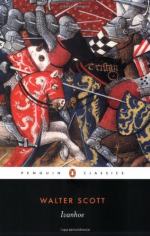|
This section contains 7,594 words (approx. 26 pages at 300 words per page) |

|
SOURCE: "Vainly Expected Messiahs: Christianity, Chivalry and Charity in Ivanhoe," in Studies in Scottish Literature, edited by G. Ross Roy, University of South Carolina, 1992, pp. 150-66.
In the essay that follows, Lackey examines the role of medieval religion in Ivanhoe through the contrast between the corruption of official representatives of the Church and the faith and compassion of Ivanhoe and Rebecca.
Ivanhoe, Scott's account of ethnic, political, and military conflict in England after the unsuccessful Third Crusade, is closer to being a religious novel than commentators have acknowledged. Its central struggle is between the forces of superstition, bigotry, and brutality and those of enlightened justice and mercy, with the varieties of religious experience in the novel serving as a medium to convey all these attitudes.
No one claims that Scott was a theologian, his Religious Discourses by a Layman notwithstanding.1 Yet the truth may be not so much...
|
This section contains 7,594 words (approx. 26 pages at 300 words per page) |

|


